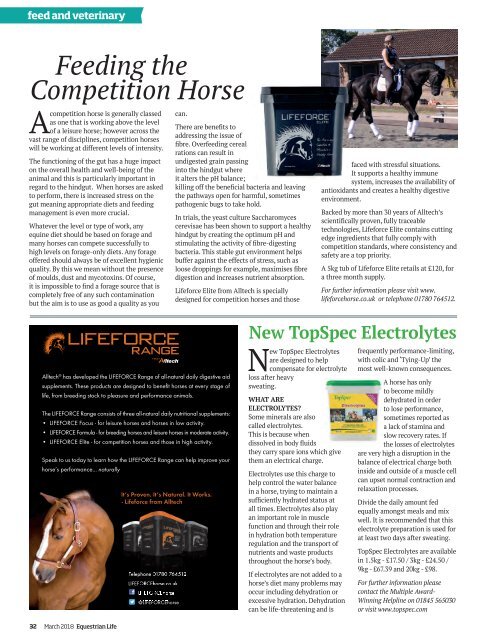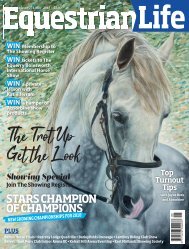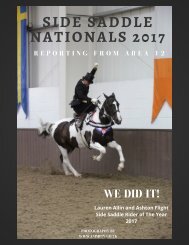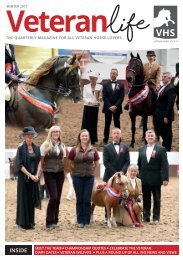Equestrian Life March 2018 Issue
Your favourite monthly magazine, full of articles and features, great competitions too!
Your favourite monthly magazine, full of articles and features, great competitions too!
You also want an ePaper? Increase the reach of your titles
YUMPU automatically turns print PDFs into web optimized ePapers that Google loves.
feed and veterinary<br />
Feeding the<br />
Competition Horse<br />
A<br />
competition horse is generally classed<br />
as one that is working above the level<br />
of a leisure horse; however across the<br />
vast range of disciplines, competition horses<br />
will be working at different levels of intensity.<br />
The functioning of the gut has a huge impact<br />
on the overall health and well-being of the<br />
animal and this is particularly important in<br />
regard to the hindgut. When horses are asked<br />
to perform, there is increased stress on the<br />
gut meaning appropriate diets and feeding<br />
management is even more crucial.<br />
Whatever the level or type of work, any<br />
equine diet should be based on forage and<br />
many horses can compete successfully to<br />
high levels on forage-only diets. Any forage<br />
offered should always be of excellent hygienic<br />
quality. By this we mean without the presence<br />
of moulds, dust and mycotoxins. Of course,<br />
it is impossible to find a forage source that is<br />
completely free of any such contamination<br />
but the aim is to use as good a quality as you<br />
can.<br />
There are benefits to<br />
addressing the issue of<br />
fibre. Overfeeding cereal<br />
rations can result in<br />
undigested grain passing<br />
into the hindgut where<br />
it alters the pH balance;<br />
killing off the beneficial bacteria and leaving<br />
the pathways open for harmful, sometimes<br />
pathogenic bugs to take hold.<br />
In trials, the yeast culture Saccharomyces<br />
cerevisae has been shown to support a healthy<br />
hindgut by creating the optimum pH and<br />
stimulating the activity of fibre-digesting<br />
bacteria. This stable gut environment helps<br />
buffer against the effects of stress, such as<br />
loose droppings for example, maximises fibre<br />
digestion and increases nutrient absorption.<br />
<strong>Life</strong>force Elite from Alltech is specially<br />
designed for competition horses and those<br />
faced with stressful situations.<br />
It supports a healthy immune<br />
system, increases the availability of<br />
antioxidants and creates a healthy digestive<br />
environment.<br />
Backed by more than 30 years of Alltech’s<br />
scientifically proven, fully traceable<br />
technologies, <strong>Life</strong>force Elite contains cutting<br />
edge ingredients that fully comply with<br />
competition standards, where consistency and<br />
safety are a top priority.<br />
A 5kg tub of <strong>Life</strong>force Elite retails at £120, for<br />
a three month supply.<br />
For further information please visit www.<br />
lifeforcehorse.co.uk or telephone 01780 764512.<br />
•<br />
•<br />
•<br />
New TopSpec Electrolytes<br />
New TopSpec Electrolytes<br />
are designed to help<br />
compensate for electrolyte<br />
loss after heavy<br />
sweating.<br />
WHAT ARE<br />
ELECTROLYTES?<br />
Some minerals are also<br />
called electrolytes.<br />
This is because when<br />
dissolved in body fluids<br />
they carry spare ions which give<br />
them an electrical charge.<br />
Electrolytes use this charge to<br />
help control the water balance<br />
in a horse, trying to maintain a<br />
sufficiently hydrated status at<br />
all times. Electrolytes also play<br />
an important role in muscle<br />
function and through their role<br />
in hydration both temperature<br />
regulation and the transport of<br />
nutrients and waste products<br />
throughout the horse’s body.<br />
If electrolytes are not added to a<br />
horse’s diet many problems may<br />
occur including dehydration or<br />
excessive hydration. Dehydration<br />
can be life-threatening and is<br />
frequently performance-limiting,<br />
with colic and ‘Tying-Up’ the<br />
most well-known consequences.<br />
A horse has only<br />
to become mildly<br />
dehydrated in order<br />
to lose performance,<br />
sometimes reported as<br />
a lack of stamina and<br />
slow recovery rates. If<br />
the losses of electrolytes<br />
are very high a disruption in the<br />
balance of electrical charge both<br />
inside and outside of a muscle cell<br />
can upset normal contraction and<br />
relaxation processes.<br />
Divide the daily amount fed<br />
equally amongst meals and mix<br />
well. It is recommended that this<br />
electrolyte preparation is used for<br />
at least two days after sweating.<br />
TopSpec Electrolytes are available<br />
in 1.5kg - £17.50 / 3kg - £24.50 /<br />
9kg - £67.39 and 20kg - £98.<br />
For further information please<br />
contact the Multiple Award-<br />
Winning Helpline on 01845 565030<br />
or visit www.topspec.com<br />
32 <strong>March</strong> <strong>2018</strong> <strong>Equestrian</strong> <strong>Life</strong>
















